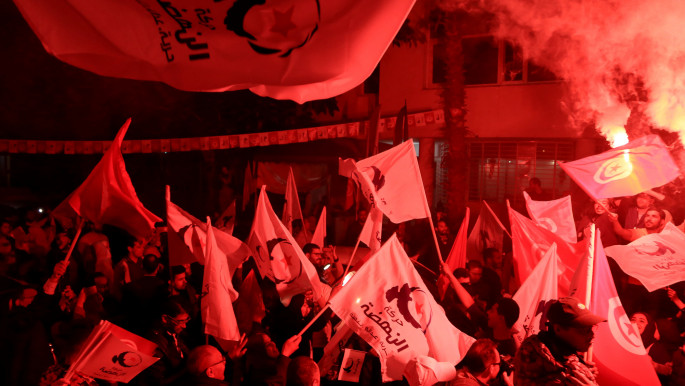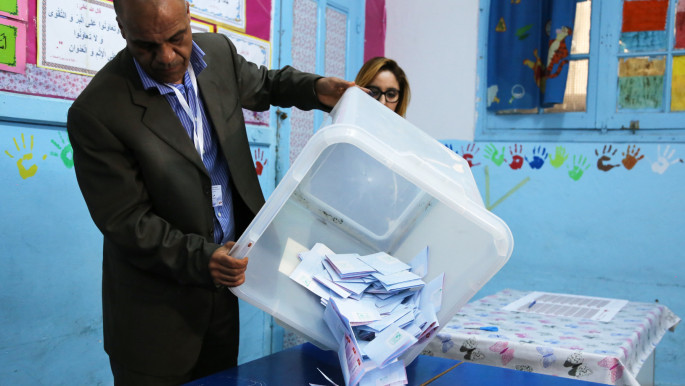Tunisia still has much democratic progress to make despite municipal elections
Over 7,200 figures, out of 57,000 candidates from 55 parties, were selected by voters across 350 municipalities. 2,173 candidate lists were presented: 350 from Ennahdha, Tunisia's largest Islamist party which came to power after the 2011 revolution.
Ennahdha won 27.5 percent of the preliminary votes according to state TV, beating the 22.5 percent of its coalition partner Nidaa Tounes. Both parties have shared power since the 2014 presidential elections – indicating the status quo has been upheld. Independent candidates made more gains, securing 28 percent of the votes.
The voting turnout was just 33 percent, according to the election commission. The results will be officially announced on May 9.
Read also: What do this week's elections mean for Tunisia?
Souad Abderrahim, a pharmacist and Ennahdha representative, became first female mayor of the capital Tunis. Around half of the candidates were women, joining Tunisia's 75 out of 217 female members of parliament.
 |
Souad Abderrahim, a pharmacist and Ennahdha representative, became first female mayor of the capital Tunis. Around half of the candidates were women, joining Tunisia's 75 out of 217 female members of parliament |  |
The military and security personnel voted a week earlier, with a maximum of 1,237 voted among over 36,000 registered voters, indicating low interest, said the head of the Independent High Electoral Commission, Mohamed Tlili al-Mansri.
Many of the new representatives have no background in politics, promising Tunisia a new generation of politicians.
 |
|
| People gather during a celebration as The Ennahda Movement won the local elections after getting 27.5% of votes [Getty] |
Possible step towards democracy
The North African country is often praised for being the only country to successfully move towards democracy after the Arab Spring. Yet many Tunisians have felt continued disappointment with poor living conditions, government corruption, and slow democratic progress.
The 2014 constitution promised decentralised governance and greater power to local authorities, which observers saw as an attempt to give Tunisians greater political representation, which could fully address their individual needs.
The elections however were postponed four times due to various logistic, administrative and political issues.
 |
The North African country is often praised for being the only country to successfully move towards democracy after the Arab Spring. Yet many Tunisians have felt continued disappointment with poor living conditions, government corruption, and slow democratic progress |  |
Youssef Cherif, a Tunis-based political analyst, told The New Arab the elections were a "first move towards the real decentralisation of power in Tunisia, and proof that Tunisia's democratic transition continues."
"In fact, there were worries that the elections would be postponed or cancelled, and many elements from Tunisia and abroad advocated for that. The fact that they are happening against all odds is already an achievement," he added.
Tunisians have lost faith in the political system
Despite President Beji Caid Essebsi's calls for a "massive turnout," much of the electorate refused to vote due to low faith in the country's political progress, even with a higher turnout than speculated.
Read also: Fears over turnout dampen Tunisia's first local elections
Many Tunisians told The New Arab that they felt voting would not solve their most difficult concerns, such as worsening economic circumstances and living conditions, as the government has not solved these problems.
"Most people around me, young and old, are not concerned with these elections as we don't feel the politicians can address our concerns like rising prices," said Sarra, a master's student from Tunis.
That the same parties remain in power will not improve these disenfranchised voters' faith in voting for future elections.
"People here struggle to buy even ordinary goods like bread and meat, and they blame the politicians for this. Some people I know are even refusing to vote in protest. Most people have really lost faith in politics," said 31-year-old accountant Fahd.
 |
Many Tunisians told The New Arab that they felt voting would not solve their most difficult concerns, such as worsening economic circumstances and living conditions, as the government has not solved these problems |  |
Tunisia's economy has weakened in recent years. The IMF in 2016 loaned Tunisia $2.9 billion to stabilise it financially, after the tourist drought which followed multiple terrorist attacks. This followed a previous loan in 2012.
Yet the IMF programme has impacted ordinary Tunisians harshly. As part of the deal, Tunisia's Dinar was devalued, and austerity measures were implemented. Since then, prises have risen while wages have stagnated, meaning sinking purchasing power for Tunisians.
Tunisians hit the streets at the start of the year, protesting the government's new austerity measures.
 |
|
|
An electoral monitor opens a ballot box at a polling station in central Tunis on May 6 [Getty] |
Could the elections see more devolution of power?
Just days before the election, Tunisia's parliament adopted a new local government code, outlining rules for devolving power to local governments.
Yet greater steps are needed to fulfil the government's decentralisation target, and it may not be a straightforward journey.
"Tunisia has always been a very centralised state, so devolution will take time," Karim Mezran, senior resident fellow at the Atlantic Council's Rafik Hariri Centre, told The New Arab. "It is definitely a learning process before it could effectively be decentralised."
The local bodies depend on adequate funding to be effective in transforming individual municipalities. Yet Tunisia currently dedicates just four percent of its funding to local bodies, in comparison to Morocco's 11 percent, and Denmark's record of 62 percent – suggesting Tunisia's are currently underfunded.
Furthermore, the elected councils currently have limited powers that will gradually expand over time.
A lack of efficient changes could also result in optimistic voters, who hope for improved services, feeling frustrated with the lack of immediate change, leaving the Tunisian electorate as a whole further alienated from politics.
"These high expectations may result in big disappointments after a few months, when the municipal councils won't be able to deliver much right away," said Cherif.
He also added the regime may actually seek to block the decentralisation attempts, to regain power within its own hands.
"Moreover, corrupt figures have likely made it in a number of municipalities, and they will try to keep the same system of favouritism and heavy bureaucracy that existed for decades."
"This will also trigger disappointments. These problems may in turn encourage the central government to put the blame on decentralisation and take back its lost privileges," he added.
These elections will be followed by legislative and presidential votes in 2019.
Jonathan Fenton-Harvey is a freelance journalist. Follow him on Twitter: @jfentonharvey







